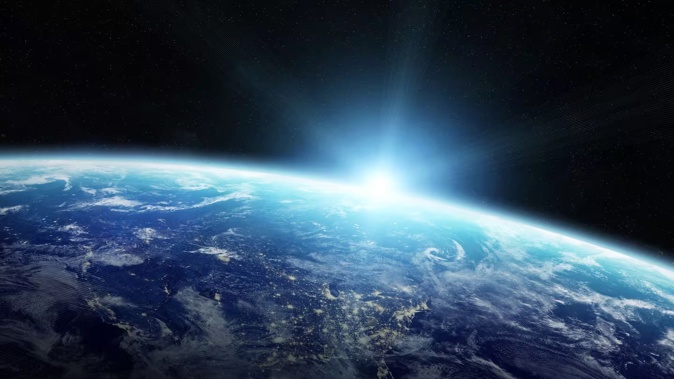
With water covering the majority of our planet, scientists have been wading through ideas to answer a fundamental question: Where did it all come from?
A popular theory suggests asteroids or comets helped bring the precious resource to Earth in chance encounters, but new evidence may be sinking this idea.
A study published in the journal Icarus showed the ingredients for water may have been present as early Earth was developing, indicating that the creation of water may be a more common process on planets than previously thought.
“We always kind of assumed that Earth was unique,” said Tom Barrett, the lead author of the study and a doctoral candidate at the University of Oxford. “We have massive oceans on our surface that are crucial to the way that we live our lives.”
Contrary to previous notions, the materials that made our planet seem to have contained the ingredients for water, he said.
Scientists have long questioned whether an early Earth could have contained the appropriate hydrogen and oxygen on its own to create the water on our planet.
The International Space Station orbits Earth. Photo / 123RF
Some think clues could be embedded in a meteorite thought to be similar to our new-born planet, called an enstatite chondrite.
These types of meteorites were formed in the inner solar system and “probably represented the bulk contribution of the material that formed Earth 4.6 billion years ago”, Barrett said.
Used as an analogue for early Earth, these meteorites embody a promising prospect for water formation.
Previous research showed they contained enough hydrogen to account for the formation of Earth’s oceans, but it identified the location of only about 20% of the hydrogen in these meteorites. It was unclear whether the rest of the hydrogen existed intrinsically in the meteorites or if the sample was contaminated on Earth.
Barrett and his colleagues aimed to account for the rest of the hydrogen. Using X-ray technology to probe an enstatite chondrite meteorite found in Antarctica, they discovered significant portions of the hydrogen attached to sulphur. To their surprise, they found the compounds in the matrix of the rock - like the dough that holds bigger grains in rock together.
The team proposed methods of how hydrogen may have appeared there. Barrett said that in the early solar system, existing iron sulphide compounds in the meteorite could have been acting as a catalyst to create the hydrogen and sulphur compound, acting like a hydrogen factory.
He said the compound could have been formed in the bigger grains within the rock and was pumped into the matrix material, which is “quite an effective way of storing quite notable concentrations of this hydrogen-bearing compound”.
The meteorite also contained oxygen, but the team did not investigate how the hydrogen-sulphur compound eventually led to water.
Other researchers say the analysis is an important step in understanding the origin of water on Earth.
“What is new is that researchers have found the location of hydrogen in enstatite chondrites, the likely building blocks of the Earth,” said Yves Marrocchi, a cosmochemist at the French National Centre for Scientific Research, who was not involved in the research.
Marrocchi was part of the team that previously found that these meteorites have a high hydrogen content but couldn’t identify the locations.
He said the findings affirm his previous conclusions that hydrogen was inherited from early in the solar system and that these meteorites contain enough hydrogen to produce Earth’s oceans.
“Earth may have had more than enough ingredients to form water from the beginning,” said planetary scientist Patrick Shober, who was not involved in the research. He added that the research shows that “water abundance on Earth is not a freak accident; it’s what was expected”.
But Shober points out that asteroids or comets could have still played an important part later in Earth’s history. For instance, the hydrogen in these enstatite chondrite meteorites matches the composition of Earth’s mantle, but it doesn’t explain hydrogen and nitrogen content in Earth’s oceans well.

Where did all the water on Earth come from? Photo / Annabel Morgan
“Later bombardments by outer solar system sources added in an additional spice to the story, modifying the isotopic make-up of our oceans,” Shober said. But he said we have “enough volatiles to make water even beforehand”.
If the ingredients for water are more abundant than previously thought, the resource could be more common on other planets, the researchers say.
For instance, evidence shows Mars may have had flowing water and appeared very similar to modern-day Earth. If Mars initially had water, Barrett said, something may have happened in its history that depleted its water.
Now, a new question arises: Is Earth habitable today because of how it formed or because of how it evolved?
Take your Radio, Podcasts and Music with you









